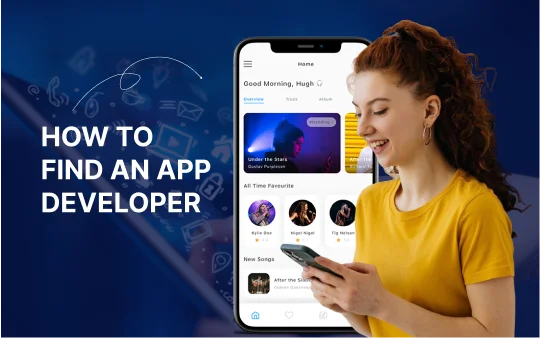Mobile apps have gained more prominence than ever before due to the smartphone revolution. Almost the entire world is on smartphones today, and they have nearly 5 million apps to choose from. Planning to have your own app stand out amongst the competition could seem unrealistic at first, but it’s entirely possible if you know the secret to successful mobile app development.
The secret recipe for a successful mobile app is in mobile app technology stacks. A good choice of a mobile apps development language helps developers build smooth, functional, efficient apps. They help businesses tone down the costs, focus on revenue-generation opportunities and plan ahead to hire mobile app developers. Most importantly, they provide customers with an excellent experience and gives them a reason to keep a mobile app installed on their phones.
So what is the ideal tech stack to use for mobile app development?
For Native mobile app development
In native mobile app development, all toolkits, mobile apps development language, and the SDK are supported and provided by operating system vendors. Native app development thus allows developers to build apps perfectly compatible with specific OS environments. However, since Android & iOS offer their own unique platforms for development, businesses have to develop multiple mobile apps for each platform.

Popular Native apps:
- Waze
- Pokemon Go
- Lyft
Top Programming languages to build native Android apps
1. Java: Java was the only and official programming language for android app development up until the introduction of Kotlin. In fact, Java itself is at the core of the Android OS. However, disputes with Oracle (which owns the license to Java) made Google shift to open-source Java SDK for versions starting from Android 7.0 Nougat.
2. Kotlin: Google declared Kotlin as the officially supported language for android app development at its annual I/O conference in 2019. Kotlin is completely based on Java but has a few additions which make it much simpler and easier to work with.
Which Programming language to use for android app development?
Well, I and a 100 developers besides me would say that Kotlin is simply better. It has a leaner, simpler and concise code as compared to Java, in addition to several other advantages with regard to handling null-pointer exceptions, more productive coding, among others.
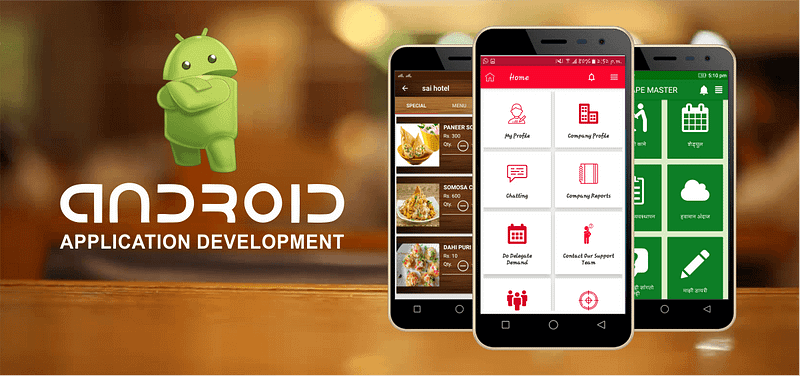
Here’s an example highlighting the conciseness of Kotlin code
Example Java Code
public class Address { private String street; private int streetNumber; private String postCode; private String city; private Country country; public Address(String street, int streetNumber, String postCode, String city, Country country) { this.street = street; this.streetNumber = streetNumber; this.postCode = postCode; this.city = city; this.country = country; } @Override public boolean equals(Object o) { if (this == o) return true; if (o == null || getClass() != o.getClass()) return false; Address address = (Address) o; if (streetNumber != address.streetNumber) return false; if (!street.equals(address.street)) return false; if (!postCode.equals(address.postCode)) return false; if (!city.equals(address.city)) return false; return country == address.country; } @Override public int hashCode() { int result = street.hashCode(); result = 31 * result + streetNumber; result = 31 * result + postCode.hashCode(); result = 31 * result + city.hashCode(); result = 31 * result + (country != null ? country.hashCode() : 0); return result; } @Override public String toString() { return "Address{" + "street='" + street + '\'' + ", streetNumber=" + streetNumber + ", postCode='" + postCode + '\'' + ", city='" + city + '\'' + ", country=" + country + '}'; } public String getStreet() { return street; } public void setStreet(String street) { this.street = street; } public int getStreetNumber() { return streetNumber; } public void setStreetNumber(int streetNumber) { this.streetNumber = streetNumber; } public String getPostCode() { return postCode; } public void setPostCode(String postCode) { this.postCode = postCode; } public String getCity() { return city; } public void setCity(String city) { this.city = city; } public Country getCountry() { return country; } public void setCountry(Country country) { this.country = country; } }
The same code in Kotlin
class Address(street:String, streetNumber:Int, postCode:String, city:String, country:Country) { var street:String var streetNumber:Int = 0 var postCode:String var city:String var country:Country init{ this.street = street this.streetNumber = streetNumber this.postCode = postCode this.city = city this.country = country } public override fun equals(o:Any):Boolean { if (this === o) return true if (o == null || javaClass != o.javaClass) return false val address = o as Address if (streetNumber != address.streetNumber) return false if (street != address.street) return false if (postCode != address.postCode) return false if (city != address.city) return false return country === address.country } public override fun hashCode():Int { val result = street.hashCode() result = 31 * result + streetNumber result = 31 * result + postCode.hashCode() result = 31 * result + city.hashCode() result = 31 * result + (if (country != null) country.hashCode() else 0) return result } public override fun toString():String { return ("Address{" + "street='" + street + '\''.toString() + ", streetNumber=" + streetNumber + ", postCode='" + postCode + '\''.toString() + ", city='" + city + '\''.toString() + ", country=" + country + '}'.toString()) } }
I’d say that Kotlin is the best option to choose for android app development. That’s because Google definitely has some plans with it since announcing it as an official language. Moreover, it signals Google’s first steps in moving away from the Java ecosystem, which is imminent considering its recent adventures with Flutter and the upcoming Fuchsia OS.
Top programming languages to build native iOS app
1. Objective-C: Similar to how Java is at the core of Android, Objective-C, a superset of the C programming language was initially used to build the core of iOS operating system used across the range of Apple devices. However, Apple soon started using swift, and its importance in iOS development has reduced greatly compared to the past.
2. Swift: Apple introduced Swift as an alternative to Objective-C in late 2015, and it has continued to be the primary language for iOS app development ever since. Swift is more functional than Objective-C, less prone to errors and has dynamic libraries that help reduce the size and app while simultaneously increasing performance.
Which programming language to use for iOS app development
This situation is in some ways similar to making a choice between Java and Kotlin. In the context of iOS, objective-C is much older than swift and has a much more complicated syntax. This essentially makes it difficult for beginners to get started with Objective-C.
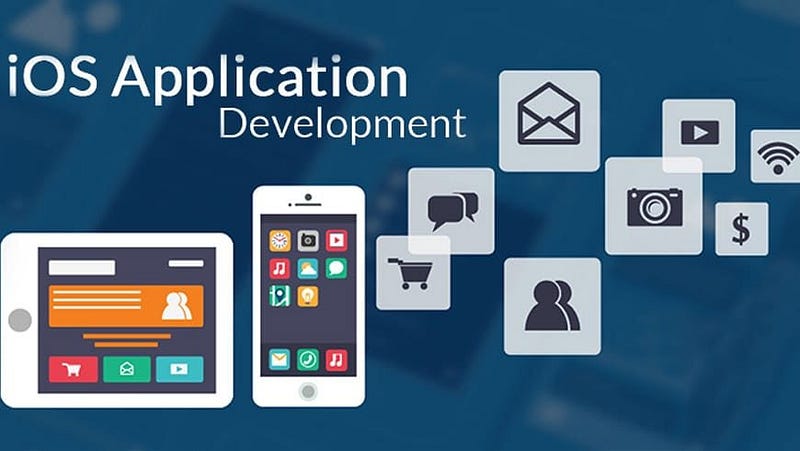
For example:
This is what you do when initializing an array in Objective-C:
NSMutableArray * array =[[NSMutableArray alloc] init];
Now look at how the same thing is done in Swift:
var array =[Int]()
Swift is much more simple, intuitive and functional. Need I say more?
For Cross-platform app development
In cross-platform app development, developers build a single mobile app that can be used on multiple OS platforms. This is made possible by building an app with a shared common codebase, which is then adapted to multiple platforms.
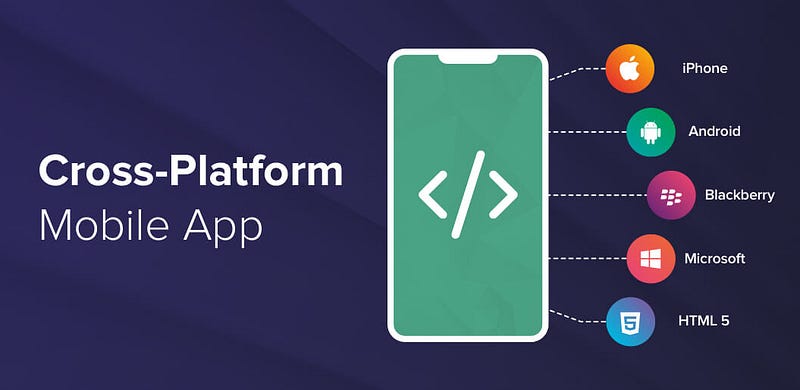
Popular Cross-platform apps:
- Skype
Get free consultation and let us know your project idea to turn it into an amazing digital product.
Top technologies to build cross-platform mobile apps
1. React Native: React Native is a mobile app development framework based on JavaScript. It is used and supported by one of the biggest social media platforms- Facebook. In cross-platform apps built using React Native, the application logic is coded in JavaScript, whereas its UI is completely native. This blog about building a React Native app is worth reading if you want to know why it’s so great!
2. Xamarin: Xamarin is a Microsoft-supported cross-platform mobile app development tool that uses the C# programming language. Using Xamarin, developers can build mobile apps for multiple platforms which could be sharing over 90% of the same code.
3. TypeScript: TypeScript is a superset of JavaScript, and is a statically-typed programming language supported by Microsoft. TypeScript can be used along with React Native framework to make full use of its error detection features when writing code for react components.
For Hybrid app development
In Hybrid mobile app development, developers build web apps using HTML, CSS & JavaScript and then wrap the code in a native shell. This allows the app to be deployed as a regular app, whilst having functionality at a level between a fully native app and a website rendered within a web browser.
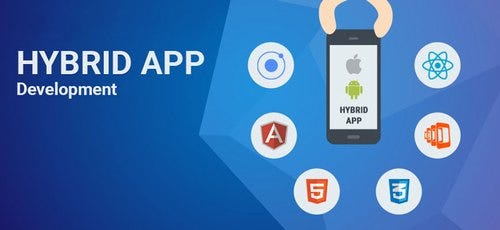
Popular apps using Hybrid app development
- Untappd
- Amazon App Store
- Evernote
Top Frameworks for building Hybrid mobile apps
1. Apache Cordova/Adobe PhoneGap: Apache Cordova is an open-source hybrid mobile app development framework that uses JavaScript for logic operations, along with HTML5 & CSS3 for rendering. PhoneGap is a commercialized, free and open-source distribution of Apache Cordova owned by Adobe. The PhoneGap platform was developed to deliver non-proprietary, free and open-source app development solutions powered by the web.
2. Ionic: Ionic is a hybrid app development framework based on AngularJS. Similar to other hybrid platforms, it uses HTML, CSS & JavaScript to build mobile apps. Ionic is primarily focused on the front-end UI experience and integrates well with frameworks such as Angular, Vue, and ReactJS.
Which mobile app technology stack will you choose?
To summarize, there are 3 types of mobile apps- Native mobile apps, Cross-platform mobile apps, and Hybrid mobile apps, each offers unique technologies, frameworks, and tools of their own. I have listed here the best mobile app technology stacks you could use for mobile app development.
The technologies, tools, and frameworks mentioned here are used in some of the most successful apps out there. With support from an expert, well-established mobile app development company, perhaps your app might get closer to similar levels of success.


